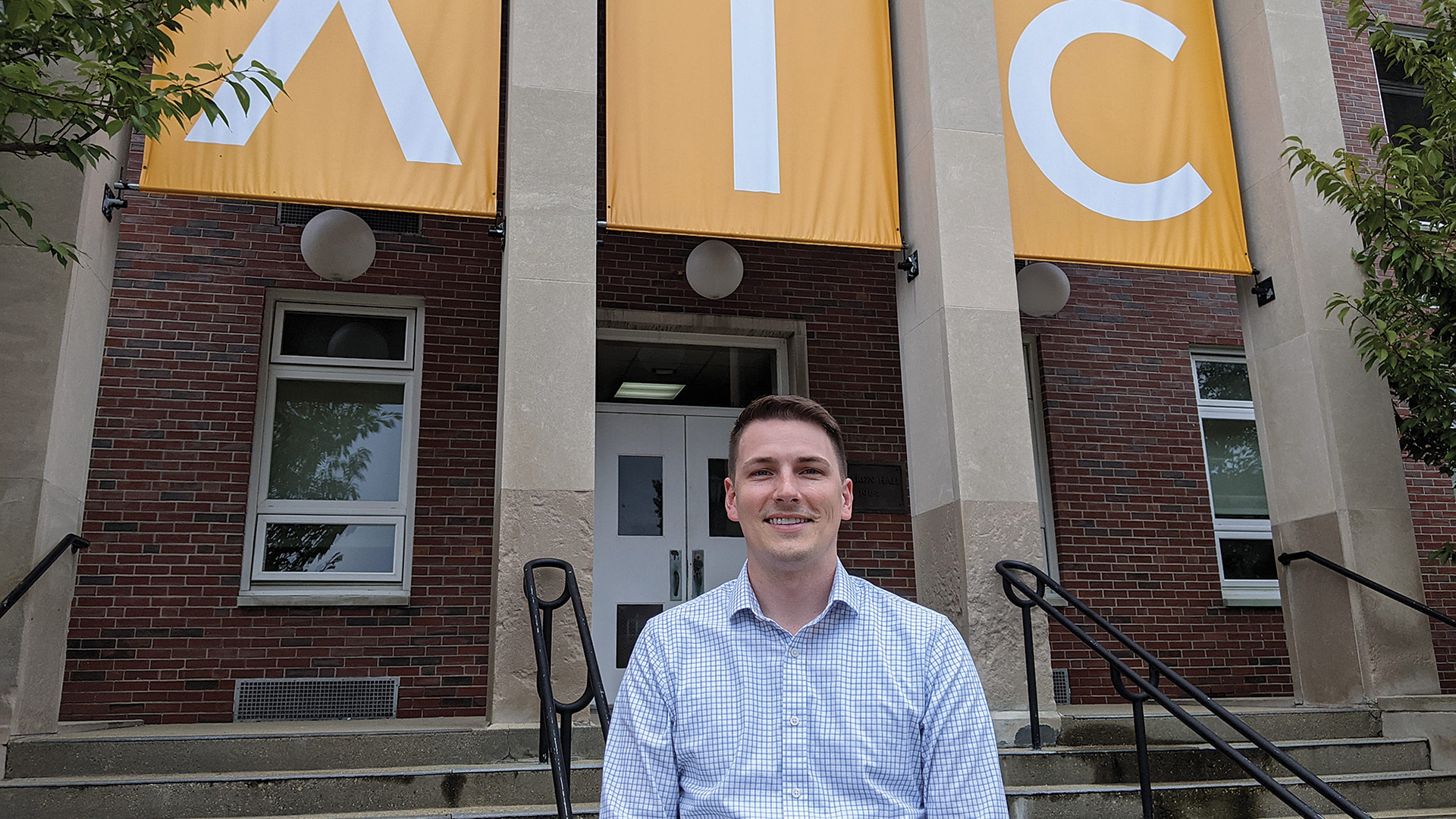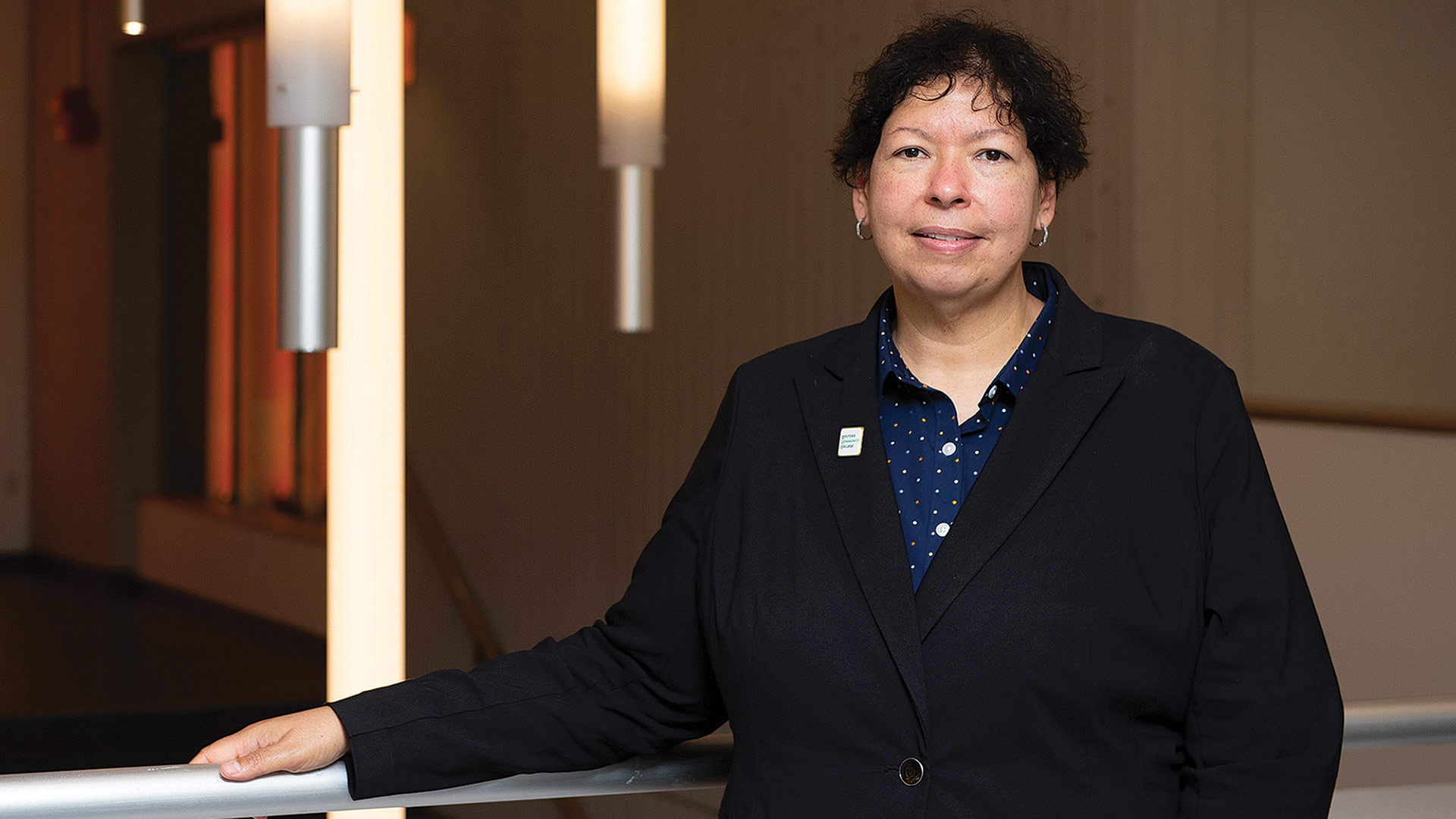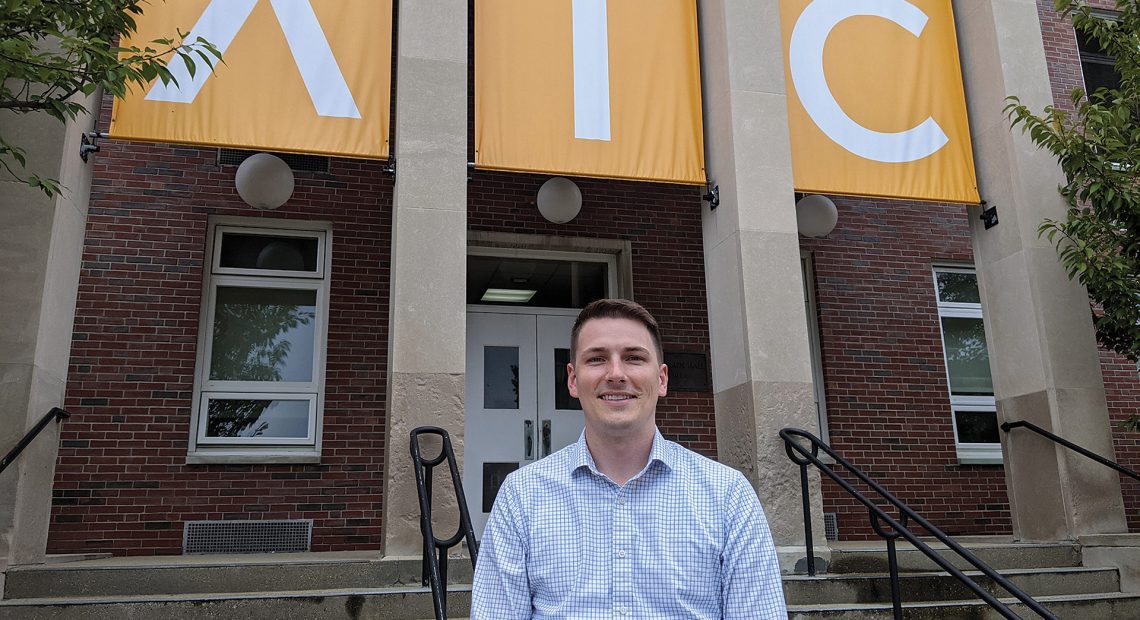Continuing Education

Matthew Scott says the double protection of vaccines and masks are a good start to keeping AIC’s campus safe.
After a year when colleges offered a wide variety of learning options during the pandemic, from in-person to remote to a blend of both, the vast majority have opened their classrooms, residence halls, and athletic fields for a true on-campus experience this fall. But they’re doing so with caution, both internally — in the form of vaccine requirements — and backed by municipalities that are issuing broad mask mandates. The bottom line through all the changes? The idea that young people need the full college experience, and no one wants to risk a disheartening retreat to Zoom.
Everyone is tired of pivoting, Matthew Scott said. But, by now, they’re good at it, too.
“We’ve learned that our students are adaptable. They don’t always want to be, but they’ll go with the flow and make it happen. And our staff members have just rolled up their sleeves and said, ‘what needs to be done?’”
As vice president for Student Affairs and dean of students at American International College (AIC) in Springfield, Scott is just one of countless higher-education administrators who have spent the past 18 months adapting to one unexpected development after another when it came to COVID-19 and how students could best learn and interact during the pandemic.
“You want to plan in times when you aren’t in the middle of a crisis, so that you’re ready to use that plan when a crisis occurs,” he said. “But when you’re thinking through your crisis-planning process, you’re thinking of things like a fire or a hurricane coming through. Nobody planned for a pandemic. We had protocols for a specific outbreak, but not something like this.”
The lesson? “We learned that we need to be agile. You might spend weeks planning something, and then one order comes through from the local or state government, and you need to pivot.”
The latest pivot for AIC, one similar to what most colleges and universities are doing, involves students living and learning on campus, with residence halls open and clubs and sports in full swing. But a facemask requirement is back, too, at least indoors. And AIC is also requiring students and employees to be vaccinated against COVID.
“We learned that we need to be agile. You might spend weeks planning something, and then one order comes through from the local or state government, and you need to pivot.”
“At last count, we were at 98%, which is a phenomenal number to get to,” Scott said, noting that religious and medical exemptions are being given, but those people are required to be tested weekly, and their quarantine and isolation protocols in the case of infection differ from those of a vaccinated individual. “So far, the vaccination rate has been helping us quite a bit.”
Elms College in Chicopee has also mandated both masks indoors and vaccination for everyone (students, faculty, and staff) without a legitimate exemption.
“Last year, masks were required everywhere. Now, they are not required outdoors if you don’t have anyone within six feet of you,” President Harry Dumay said. “We don’t have distancing in the clasrooms like last year. But we’ll be functioning with a campus that is fully vaccinated.”
While students could choose to take classes in person or remotely last year, Dumay said the college is asking all undergraduates to be in classrooms this year, although remote capabilities are in place in case someone needs to quarantine.

President Harry Dumay says Elms College not only has a plan for this fall, but “a backup to the plan and a backup to the backup.”
“We thought this year would be completely free of all these things, but what we’re seeing in the region and on campus are a lot of breakthrough cases, and Delta is more contagious than the original virus,” Dumay said.
When asked about pushback from students on the vaccine mandate, he said he wouldn’t use that word, exactly. “We certainly had quite a few inquiries from parents, saying, ‘is that necessary?’ Or from staff or employees asking, ‘so what does that mean if I don’t do it?’ I don’t know if anyone resigned on our campus or decided not to come because of the vaccination. There might be one or two cases, but I haven’t heard that.”
Scott said students tend to understand that vaccines not only prevent COVID in many cases, but reduce its severity in others.
At the same time, however, “college-age people are not particularly concerned about hospitalization or death because, for the vast majority of them, they’re able to weather the storm and get through it. But part of the education process is making sure they understand it’s not just about them, it’s about the people around them who might have underlying conditions they might not know about.”
If there has been any pushback, he noted, it has taken the form of questions about why both vaccines and masks are necessary.
“We thought this year would be completely free of all these things, but what we’re seeing in the region and on campus are a lot of breakthrough cases, and Delta is more contagious than the original virus.”
“We’d say, ‘yes, you’re vaccinated, and yes, that probably means there’s a lower likelihood of you contracting COVID, but if you do, you might not know you have it, and you might pass it on to somebody else — maybe a child who can’t get a vaccine, or maybe someone who’s immunocompromised,’” he explained. “For the most part, people get it. More than 1,000 U.S. colleges are requiring vaccines, so we’re among many at this point.”
Taking Their Shot
Holyoke Community College President Christina Royal said HCC balanced the desire among many students to get back to in-person learning with the constantly changing health metrics around the Delta variant. “So we decided to open with about a third of classes in person, face to face; a third online; and another third blended of some sort.”
The original plan earlier this summer called for about 25% of classes in person, she explained, “but as those classes were filling up, we heard students wanted more of them, so we added some additional sections. Then we increased class sizes, which were lowered during the pandemic.”
Now 15 students are allowed in a class, still small enough to allow for social distancing, Royal said.
At the same time, “we were also hearing from other students who were not comfortable coming back in, given the conditions in the world. So that’s where we are this semester — we wanted to have a range of options for students so we can match whatever their comfort level is.”
HCC has had a mask mandate on campus since the start of the pandemic and has never lifted it. The college also modified its ventilation systems. “We have several classrooms that don’t have windows, and we wanted to make sure people felt comfortable in the learning spaces.”
In addition, the campus added protective barriers in many places and signage reminding students about masks, social distancing, and hand washing, as well as the need to get vaccinated.

Holyoke Community College President Christina Royal says the state’s community-college presidents are unified in their support of a vaccine mandate.
That is more than a nudge now, as all 15 community colleges in Massachusetts instituted a vaccine mandate last week for all students, faculty, and staff, which must be fully met by January.
“During the last 18 months, the Massachusetts community colleges have prioritized the health and safety of our communities while also recognizing that many of our students have been disproportionately impacted by the COVID-19 pandemic,” the presidents said in a statement shared with their campuses. “While a significant number of students, faculty, and staff are already vaccinated or are in the process of becoming vaccinated, the 15 colleges are seeking to increase the health and safety of the learning and working environment in light of the ongoing public health concerns and current guidance from the Centers for Disease Control and Prevention.”
In her own message to the HCC community, Royal noted that, “while there is no ironclad defense against coronavirus, extensive public-health research has shown that vaccination greatly reduces the risk of hospitalization and death.”
While the UMass system has not yet instituted a vaccine mandate, UMass Amherst is strongly advising shots for all students and employees. “The science is clear that vaccination is the best way to stop COVID-19 from spreading, and our best way to continue protecting each other’s well-being,” an official statement reads.
In the meantime, individuals who are not vaccinated are required to participate in the university’s asymptomatic testing program.
UMass Amherst is also back to in-person learning, but is following public-health guidelines for wearing masks indoors and distancing where possible.
“If we need to do more education and bring some public-health experts in to reduce misinformation and allow for people to get the facts, then we’ll certainly do that as part of our strategy.”
“The use of indoor masks, required on campus and in the town of Amherst … reduce the spread of infection, said Ann Becker, Public Health director, and Jeffrey Hescock, executive director of Environmental Health and Safety, in the campus’ Public Health Promotion Center, in a statement. But they also laid out the stark facts when it comes to vaccination.
“Our data shows that, among our vaccinated population, only 1.7% have tested positive. Among the approximately 500 individuals who have received religious or medical exemptions from vaccination, 10.05% have tested positive. We urge those not yet vaccinated to consider doing so.”
They noted, however, that positive cases have been predominately among undergraduate off-campus students connected to unmasked social activities. “We have not seen any spread in academic settings. Most cases continue to be of short duration, resulting in mild to moderate illness.”
UMass makes vaccine clinics readily availabe on campus, as do the 15 community colleges. HCC offers free COVID-19 vaccinations for four hours every Tuesday, as well as COVID-19 testing six days a week on campus through the Holyoke Board of Health.
Royal was adamant that a vaccine mandate was the right call.
“I think this is in our collective best interest, for our community colleges and for our region as well,” she told BusinessWest. “At this point, the vaccines have been shown to be effective when we’re talking about preventing disease or reducing hospitalizations and deaths.”
She recognizes that people have many different perspectives that should be respected, but that the college has a duty to combat misinformation.
“If we need to do more education and bring some public-health experts in to reduce misinformation and allow for people to get the facts, then we’ll certainly do that as part of our strategy.”
Life of the Campus
In some ways, it has been a frustrating start to the semester, Dumay said, noting that the general feeling earlier in the summer was that masks would be optional, let alone vaccines, as COVID gradually retreated. While it hasn’t, he noted that it’s important for students to safety enjoy the full Elms experience.
“One of the distinctive features of an Elms College education … is that it offers a vibrant and nurturing environment, and not just with the instruction that happens in the classroom,” he said. “It’s all the interactions and how people behave with one another.”
College leaders believe important personal growth occurs through that interaction, he added.
“You can’t really do that with an online model. You can approximate it, but it’s not ideal. So to the extent we can, we’ll take the steps that are necessary so we’re safe and have an on-campus education, particularly for young people who are at that stage in their life where they’re forming their character.”
Like Scott, Dumay said the key lesson from the pandemic has been that it’s good to have a plan, but one thet can be modified at any given time. “We have a backup to the plan and a backup to the backup. We’re prepared to shift as the environment changes.”
The second lesson is the importance of transparent communication, he noted, because without it, people tend to fill the gaps with misinformation.
“We’re not pretending the pandemic is over by any means,” AIC’s Scott said. “We’re complying with the Springfield mask mandate right now and requiring masks indoors and outdoors when you can’t maintain the six feet. But we still have a tent set up outside; we’re trying to drive people outside as much as possible, just as an extra layer of protection.
“But the 98% vaccination rate, along with masking — I don’t want to give people a false sense of security where you don’t have to be vigilant, but we’re feeling pretty confident that we’re doing what we need to do to keep people safe.”
If a pocket of infection arises, the campus is ready to bring in more testing supplies and trigger quarantine protocols, but Scott feels like the double protection offered by vaccines and masks are the best way to keep that possibility at bay.
“There’s no one to be mad at,” he added. “I’m not mad at the mayor for putting in a mask mandate; he’s doing what needs to be done to keep the people in the community safe. But is it frustrating when you think you have a plan and the pandemic doesn’t cooperate? Of course, but a virus doesn’t cooperate.”
What makes all the planning and inconveniences worthwhile, he said, was seeing the energy of the students as they moved back onto campus a month ago.
“It was kind of a heartwarming moment seeing some of these returners … they left in March of 2020, and they didn’t come back until the beginning of this September. So when they see each other in person for the very first time in a long while, you can see it, you can feel it. They want to be with each other.
“We believe in the on-campus experience,” he added. “They’re coming here for all these things — to participate in athletics, to live in the residence halls, to eat in the dining commons. We’re on an online campus in this moment.”
Dumay saw the same energy at the Elms — and doesn’t want to do anything that might threaten to snuff it out.
“The first week, seeing students back on campus, was fantastic,” he said. “They’re happy to be here. They don’t want to be sent back to Zoom. They’re happy to be with each other. And we’re happy to see them.”
Joseph Bednar can be reached at [email protected]






